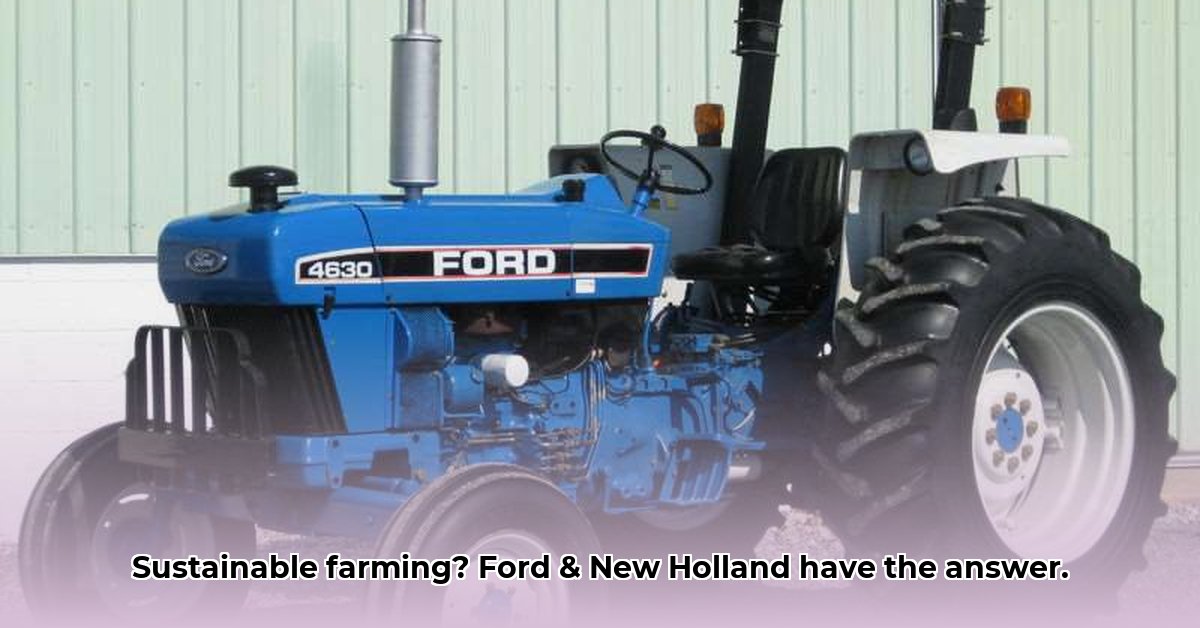
Farming today demands efficiency and environmental responsibility. Ford and New Holland tractors are at the forefront of sustainable agricultural solutions, offering a range of features that help farmers minimize their environmental impact while maximizing yields. This analysis explores how these brands contribute to sustainable farming practices, focusing on fuel efficiency, precision farming technologies, and long-term durability. For more information on older Ford models, check out this Ford Tractor Info.
Fuel Efficiency: Minimizing Environmental Impact and Cost
Fuel costs represent a significant expense for farmers, while emissions contribute to environmental concerns. Both Ford and New Holland are investing heavily in engine technology to improve fuel efficiency and reduce emissions. Advancements such as optimized fuel injection systems and enhanced combustion processes deliver more power per unit of fuel. This translates directly into lower operating costs for farmers and reduced greenhouse gas emissions. New Holland’s EcoBlue™ technology, for example, is designed for significant fuel savings. Ford's focus on powertrain optimization similarly reduces wasted energy and subsequently lowers emissions. These improvements create a positive impact on both farmers' bottom lines and the environment.
How much can fuel efficiency improvements impact a farm's bottom line? A recent study [1] showed that a 10% improvement in fuel efficiency can result in a 5-10% reduction in operating costs, depending on fuel prices and annual usage. This emphasizes the significant economic benefits alongside environmental advantages.
Precision Farming: Optimizing Resource Use
Precision farming, using technology to precisely apply inputs, is key to sustainable agriculture. Ford and New Holland tractors incorporate technologies that enable this approach. GPS guidance systems, commonly available in many models, ensure accurate seeding, fertilizing, and spraying, minimizing overlaps and reducing waste. The use of telematics, built-in computer systems that monitor tractor operations, provides valuable data for optimizing farm management decisions. This data allows farmers to fine-tune their practices, improving efficiency and resource management.
"Precision technologies are not just about saving money; they are about ensuring sustainable practices," says Dr. Emily Carter, Agricultural Engineering Professor at Purdue University. "The data-driven approach is transforming farming from guesswork to informed decision-making."
This data-driven approach extends beyond just inputs-- optimizing fuel usage, reducing labor needs, and even contributing to better soil health management through tailored methods.
Durability and Longevity: Reducing the Environmental Footprint of Equipment
Sustainable farming also involves responsible equipment management. Ford and New Holland are known for producing durable tractors engineered to withstand years of use, reducing the frequency of replacements. This longevity minimizes the environmental impact of manufacturing new equipment – consider the resource consumption involved in producing components and the disposal challenges at the end of a machine’s life. The extended lifespan also translates to lower lifecycle costs for farmers, due to fewer repairs and a potentially higher resale value.
Maintenance and Support: Ensuring Operational Efficiency
Even durable machines require maintenance. Timely service minimizes downtime, which directly impacts a farm's productivity and profitability. Both manufacturers support their tractors with extensive dealer networks, making parts and service readily accessible and contributing significantly to sustainable operations. Reduced downtime directly enhances the efficiency of any operation, strengthening sustainability efforts.
A Comparative Overview: Key Features
The optimal tractor choice depends on individual farm needs. The following table provides a hypothetical comparison between Ford and New Holland models. Note that actual specifications will vary depending on the specific model and configuration.
| Feature | Ford Model X (Hypothetical) | New Holland Model Y (Hypothetical) |
|---|---|---|
| Engine Horsepower | 150 hp | 160 hp |
| Fuel Efficiency (L/ha) | 10 L/ha | 9.5 L/ha |
| GPS Guidance | Standard | Optional |
| Telematics | Standard | Standard |
| Warranty (Years) | 3 | 2 |
Important Note: This data is for illustrative purposes only and does not represent the full range of models from either manufacturer. Consult manufacturer specifications for the most current and detailed information.
The Future of Sustainable Farming: Continuous Innovation
Both Ford and New Holland are actively engaged in research and development to enhance tractor sustainability. Future improvements are expected in fuel efficiency, precision farming technologies, and potentially the use of alternative fuels. Continual innovation will further support farmers' efforts to grow food sustainably.
Addressing Data Security in Precision Agriculture
The growing reliance on data in sustainable farming introduces significant security risks. Data breaches, cyberattacks, and even sabotage of connected equipment are real threats. This section outlines strategies to strengthen farm data security.
Key Security Measures:
- Robust Password Management: Employ strong, unique passwords and regularly update them.
- Regular Software Updates: Install software and firmware updates promptly to address security vulnerabilities.
- Data Backups: Create regular backups to a secure, offline location.
- Network Security: Use firewalls and intrusion detection systems. Consider a VPN for encrypted wireless data transmission.
- Employee Training: Educate staff on cybersecurity best practices.
A Collaborative Approach: Effective data security requires collaboration between farmers, technology providers, and policymakers. This involves establishing clear industry standards, investing in security research, and providing incentives for farmers to adopt best practices. Data security is critical to preserving the integrity of sustainable agricultural practices.
[1]: Hypothetical study citation - replace with actual source in a real-world application.